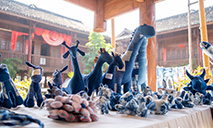Feature: Chinese Juncao technology spells bright future for Tanzania's mushroom growers

Bathsheba Mchuza, founder and sales officer for Uyogaplus project, shows the growing of mushroom during a workshop on "Applications of Juncao Technology and its Contribution to the Achievement of Sustainable Agriculture and the Sustainable Development Goals in Tanzania" in Kinondoni District, outskirts of Dar es Salaam, Tanzania, on March 10, 2022. (Photo by Herman Emmanuel/Xinhua)
DAR ES SALAAM, March 11 (Xinhua) -- Participants in a workshop held in Tanzania's capital Dar es Salaam wore broad smiles as they were exposed to the wonders of a Chinese Juncao technology saying the technology spelled a bright future for mushroom growers and livestock keepers in the country.
Juncao, which in Chinese literally means "mushroom" and "grass", can be used, as its name suggests, to grow edible and medicinal mushrooms, as livestock feed or as a green barrier to control soil erosion and stop desertification.
The Juncao technology has been developed by the National Engineering Research Center for Juncao Technology of the Fujian Agriculture and Forestry University (FAFU) of China.
The technology has a multi-faceted approach of cultivating mushrooms for food and medicinal purposes while at the same time addressing soil erosion for maintaining the volume of arable land, and also supporting livestock feed development.
On the third day of the workshop on "Applications of Juncao Technology and its Contribution to the Achievement of Sustainable Agriculture and the Sustainable Development Goals in Tanzania" organized by the United Nations Department of Economic and Social Affairs (UN-DESA), the participants visited Uyogaplus, a mushroom farm at Mabwepande in Kinondoni district on the outskirts of the commercial capital Dar es Salaam.
The Uyogaplus project is an intensive program of health and economic empowerment of women and youth through mushroom production in Tanzania.
"We have been producing mushrooms by using sawdust, banana leaves, and other supplements which are very expensive. We are now in the process of adopting Juncao grass as a substitute for sawdust," said Bathsheba Mchuza, founder and sales officer for Uyogaplus project.
Uyogaplus has established a nursery for cultivating Juncao grass for growing mushrooms, said the 25-year-old female university graduate, adding that the Juncao grass seedlings were planted in February 2021 after they were supplied by the Sokoine University of Agriculture (SUA) based in Morogoro region that introduced the technology to the project.
"By using Juncao grass to cultivate mushrooms the future looks brighter," Mchuza told the participants of the four-day workshop that brought together national policy makers, academicians, researchers, farmers, livestock keepers and experts from FAFU and the UN.
Mchuza is among 5,000 mushroom growers in Tanzania who are producing 1,000 tons of mushrooms annually.
Elly Ligate, a senior lecturer, researcher and national Juncao technological consultant at the SUA, with over five years of experience in Juncao technology projects in Tanzania, said the Juncao technology is being championed by the Ministry of Livestock and Fisheries in Tanzania mainland and the Ministry of Agriculture, Irrigation and Livestock in Zanzibar, adding that farmers and local government authorities in the country have widely accepted the technology.
"I see good opportunities as far as Juncao technology is concerned. This technology is comprehensive as it involves production of grass and mushrooms. The Juncao grass is very important in our country in eliminating challenges of shortage of fodder," Ligate, an ecologist, told Xinhua on the sidelines of the workshop.
"The second challenge that we want to address is environmental degradation. If we provide grass to livestock keepers it will improve carrying capacity and minimize the pressure on the land. In that case, management of the land will be a little easy," said Ligate, a PhD graduate at Fujian Agriculture and Forestry University of China (FUFA) where he also learnt about the Juncao technology.
Asimwe Rwiguza, director of Grazing Land and Animal Feed Resources in the Ministry of Livestock and Fisheries, said intensification of high forage producing species such as Juncao grass is a useful strategy to ensure sustainable pasture production in order to feed the existing and ever-increasing number of livestock throughout the year.
Rwiguza said the Juncao technology is expected to conserve the environment through sustainable livestock production, especially in semi-arid areas of the country where animal pastures are limited and land degradation is high.
Lin Zhanxi, inventor of Juncao technology, and chief scientist and director of the National Engineering Research Center for Juncao Technology of the FAFU of China, said on a video conference that Juncao technology is helping in adapting and mitigating challenges posed by climate change.
Yuan Lin, the economic and commercial counselor of the Chinese Embassy, said during the past two decades, this handy and practical technology has taken root in more than 100 countries.

Participants visits Uyogaplus Farm during a workshop on "Applications of Juncao Technology and its Contribution to the Achievement of Sustainable Agriculture and the Sustainable Development Goals in Tanzania" in Kinondoni District, outskirts of Dar es Salaam, Tanzania, on March 10, 2022. (Photo by Herman Emmanuel/Xinhua)

Elly Ligate, a senior lecturer, researcher and national Juncao technological consultant at Sokoine University of Agriculture, shows the Juncao grass during a workshop on "Applications of Juncao Technology and its Contribution to the Achievement of Sustainable Agriculture and the Sustainable Development Goals in Tanzania" in Kinondoni District, outskirts of Dar es Salaam, Tanzania, on March 10, 2022. (Photo by Herman Emmanuel/Xinhua)
Photos
 Traditional tie-dye products of Buyi ethnic group in Guizhou popular among tourists
Traditional tie-dye products of Buyi ethnic group in Guizhou popular among tourists Girls from mountainous areas in Hainan pursue football dreams
Girls from mountainous areas in Hainan pursue football dreams Chinese artist forms elaborate images using whisked tea foam in revival of Song Dynasty’s cultural splendor
Chinese artist forms elaborate images using whisked tea foam in revival of Song Dynasty’s cultural splendor Wild lilies in full bloom as snow melts in Xinjiang
Wild lilies in full bloom as snow melts in Xinjiang
Related Stories
- Tanzania recommends adoption of Chinese Juncao technology to promote sustainable agriculture
- Feature: Chinese company protects wildlife while building hotels in Tanzania
- Former African diplomats recall joys at China's restoration of lawful seat at UN
- Tanzania's Zanzibar decorates Chinese medical team with special medals for outstanding work
- Tanzania's Zanzibar receives China-donated COVID-19 vaccines
- Xi says China ready to work with Tanzania to safeguard developing countries' legitimate rights, interests
- Decades on, devotion of Chinese experts still commemorated in Tanzania
- Tanzanian President John Magufuli dies aged 61
- 5.0-magnitude quake hits Liuli, Tanzania -- USGS
- Tanzanian makes home in China, hopes to establish version of Alibaba in Africa
Copyright © 2022 People's Daily Online. All Rights Reserved.






